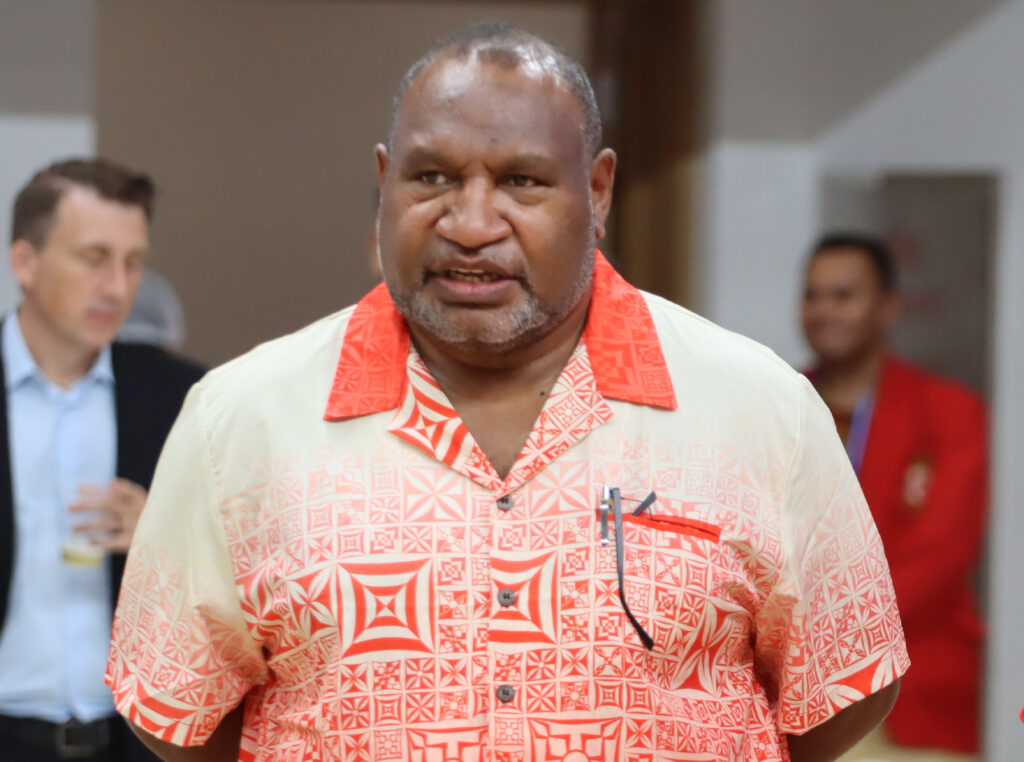Tuesday August 2024

Nuku’alofa, Tonga – Prime Minister Hon. James Marape, in a statement today at the Pacific Islands Forum (PIF) Leaders Meeting in Nuku’alofa, Tonga, called on G20 nations to intensify their climate mitigation efforts in support of the Pacific, in line with the 2050 Strategy for the Blue Pacific Continent.
Prime Minister Marape’s appeal came in response to United Nations Secretary-General Antonio Guterres’ statement to the PIF this morning, highlighting that 80 percent of the global carbon footprint is attributed to G20 nations.
“I call directly for G20 nations, especially the USA, China, and Japan—three strong associates of Pacific nations—to step up in their mitigation efforts to the Pacific, consistent with our 2050 Strategy for the Blue Pacific Continent.
“Australia is contributing $100 million into our Pacific Climate Resilient Fund,” said Prime Minister Marape.
In his three-minute response to the UN Secretary-General’s statement, Prime Minister Marape emphasised the importance of global responsibility in addressing climate change.
He welcomed the UN’s continued support for Pacific nations and reaffirmed the region’s commitment to building a resilient future.
“We recognise the unprecedented challenges we face, from climate change to poverty alleviation and improved living standards.
“However, we also emphasise that Pacific nations are not just victims of climate change but also the world’s largest carbon sink, thanks to our vast forests and oceans.
“Papua New Guinea, for example, has a negative carbon footprint of over 90 million metric tonnes, courtesy of our tropical rainforests.
“ We propose that our carbon cleaning resources be utilised to assist debt relief and generate economic gains for our economies.
“Furthermore, we call on the big carbon footprint holders to adequately compensate us for our forest and ocean carbon sinks,” said Prime Minister Marape.
Prime Minister Marape also commended Australia for its recognition of the 2050 Strategy for the Blue Pacific Continent and their contributions towards addressing climate change challenges faced by Pacific nations.
“We commend Australia, a G20 economy in our region, for becoming an active climate resistance partner.
“We urge others, especially the world’s top three economies and significant carbon footprint holders, to support the Pacific Islands Forum through clean energy options, land reclamation, and growing our economies from our own resources, such as marine resources.
“In addition to climate action, we prioritise poverty alleviation and improved living standards. We must invest in education, health care, infrastructure, and sustainable development to drive economic growth and reduce inequality.
“We emphasise the importance of regional cooperation, trade agreements, investment, and cultural exchanges to enhance our collective resilience.
Prime Minister reaffirmed Papua New Guinea’s commitment to the Pacific Islands Forum and the region’s prosperity, and looks forward to working together to build a brighter future for the Pacific people.
To address climate change challenges in the Pacific region, Prime Minister Marape stressed the importance of strengthening the collective response through shared knowledge, resources, and advocacy.
He also highlighted the need to enhance regional economic integration through trade agreements, investment, and private sector engagement, as well as fostering greater cooperation in health, education, and disaster resilience.
“Assisting Small Island States with low-cost clean energy, water desalination, and land reclamation, and recognising the importance of cultural heritage and traditional knowledge in our development journey would help towards this cause,” said Prime Minister Marape.

